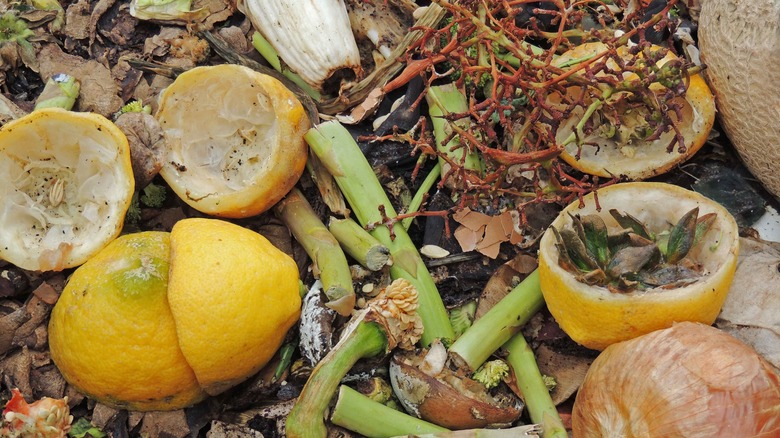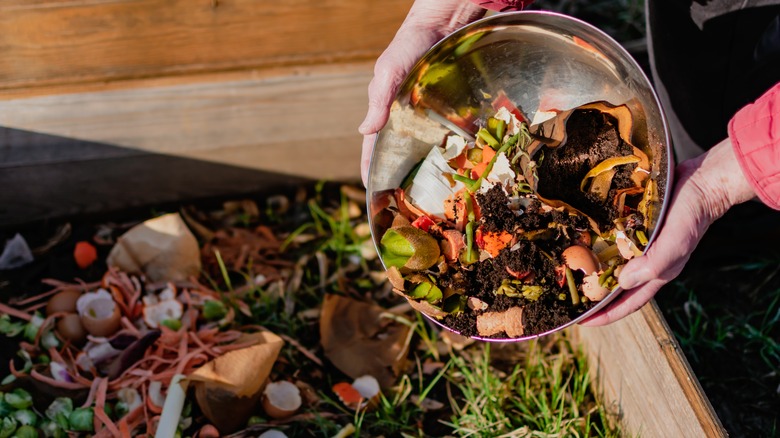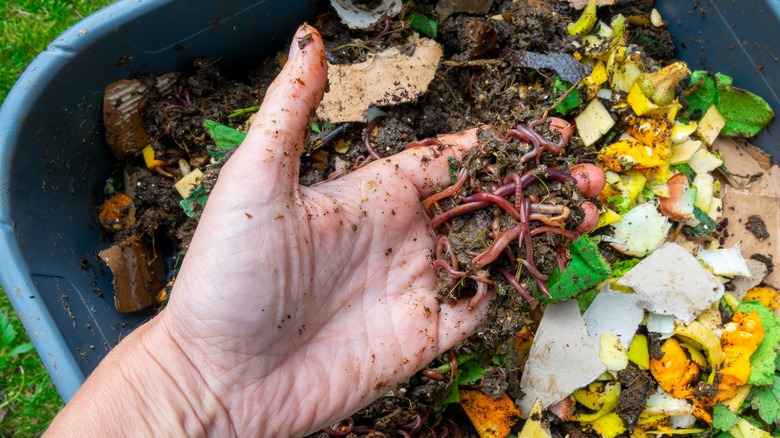When Life Gives You Lemons, Make Lemonade (& Throw The Peels Into Your Compost Pile)
Lemons are a versatile fruit that's the perfect addition to a variety of dishes and tasty beverages. While lemons are in season year-round in the United States, summer is ideal for citrus goodies. What could be better than a glass of frosty cold lemonade? Once you make the refreshing beverage or another lemon-accented dish, you'll likely have peel scraps left over. Before you throw them in the trash, consider a new way to repurpose them. While you could use lemon scraps to clean your home, lemons are also a great addition to your compost pile, as they add nitrogen and may help keep animals away.
Composting is an excellent way to reduce waste, especially since the U.S. Environmental Protection Agency (EPA) states that food waste is the most common material in U.S. landfills. A composting pile is made up of carbon and nitrogen from organic matter like food peelings, debris, and other items, which microorganisms turn into a soil form called compost. Composting adds rich nutrients to soil and improves its water conservation, enabling it to hold more water. When added to the soil in your garden, this material can greatly benefit your plants. It might seem like just a lemon peel, but like orange peels, those little citrus scraps can offer a big boost to your compost pile.
Composting with lemon peels
A common gardening myth is that lemons don't belong in the compost pile because they don't easily decompose and they release too much acid for your soil. While it is true that lemons are more acidic than oranges, lemons can easily go in your compost heap within moderation. Once you have a lemon scrap or two, you can combine it with your other food waste and throw it in your bin or pile. Further, cutting the peel into small pieces will help it break down. The benefits are twofold: a healthy dose of nitrogen in the soil, plus some believe that lemon is also an effective pest deterrent that can keep unwelcome guests away from your compost. This includes critters like mice, cats and dogs, and some insects.
However, too much acid from citrus fruits could potentially alter the balance of your compost pile. Be careful to only throw in an occasional scrap and not a large pile of lemon scraps all at once to make the decomposition process easier. Regardless of its contents, the key is to balance out your DIY compost pile with other scraps. Lemons are a "green" compost material, so they're rich in moisture and nitrogen. If you add a heap of green compost material, you need to mix in an equal amount of "browns," or carbon-based materials such as dead leaves, newspapers, and straw.
When to avoid composting lemon scraps
If you're just using a kitchen countertop composter to break down citrus scraps, you can easily add lemon peels to your compost pile to balance out your greens and browns. However, if you're a vermicomposter, you should be wary of adding too many citrus peels at once. Unlike regular composting which largely uses microorganisms to convert scraps into compost, vermicomposting uses worms. As the worms eat the organic material, it passes through their body, eventually becoming worm compost.
Vermicomposters should avoid composting lemon scraps regularly, as citrus fruits contain the chemical limonene. Limonene is toxic to worms, so avoid feeding them mass quantities of citrus. The presence of citrus in the pile can also add too much acid to the worms' environment and can take longer to break down. A citrus peel here and there is okay, but don't go overboard with the citrus fruits or you may kill your compost buddies. The same warning for moderation applies for a regular compost pile as well.


